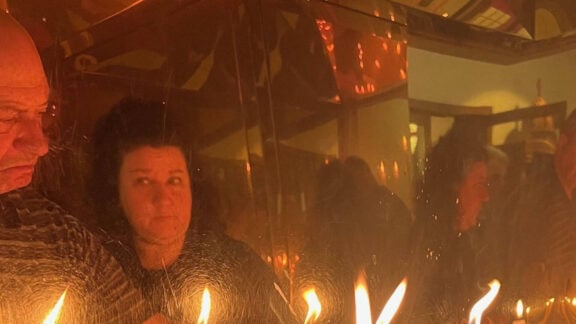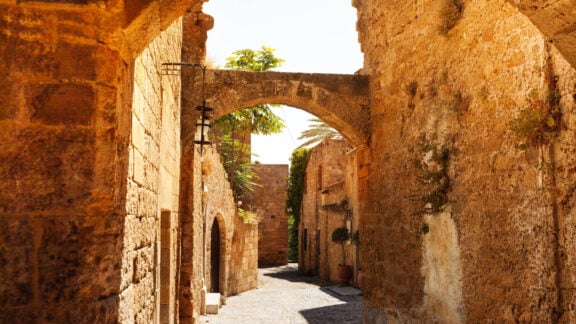Last weekend, Melbourne got a new Lord Mayor. After a quick and rather uneventful process, Sally Capp managed to beat her opponents and started talking about implementing her program: extending the free tram zone, seeing that the Queen Victoria Market redevelopment goes forward, creating an elevated “high-line” park corridor along the Yarra, from Federation Square to the Docklands.
Some citizens of Melbourne could not care less about all this. Their focus was on another mayor, that of a city about 15,000 kilometres away. Because on the same weekend, Yannis Boutaris, mayor of Thessaloniki was fiercely attacked while on his way to attend a commemorative event on the Pontian Genocide. When he reached the area, people started shouting profanities at him, and a handful of people started hitting him, continuing to kick him as he was laying on the ground.
The image of an elected official, a septuagenarian no less, being savagely attacked is a disgrace.
The event sparked a furious debate in Greece between moderates and hot-headed nationalists. Most people spoke in condemnation of the act, lamenting resort to violence to tackle a political debate. But even among those, there were voices saying that Boutaris had it coming. Why? Not even his attackers could say.
Four people have been identified, three of whom were brought to justice and found guilty of assault, facing sentences of 14 to 21 months. None of them were able to defend their actions. One claimed that he was under the influence of drugs and alcohol (he went on to rob a butchery after the assault), another cried and said he did not know who he was hitting and that he was carried away by the mob, only the third said that he had heard the mayor’s anti-Greek statement.
The statement in question was in a video that had been circulating for days – it shows Boutaris saying “I don’t give a shit if Kemal killed Greeks”.
People were outraged. To add insult to injury, the city council had planned to host a Gay Pride event on the same day as the Pontian Genocide commemoration. What other proof could anyone need of the mayor’s utter disrespect to the Pontian population, or even to any patriot?
Boutaris has been so arrogant about the way he dismisses Greeks and promotes the country’s enemies, that of course he had it coming. Throughout, the whole of the Greek social media sphere debate was flaming. Keyboard warriors were foaming from the mouth, calling Boutaris a ‘traitor’ a ‘jewphile’, a ‘pig’, a ‘wanker’ (these are only few of the most common words used against him).
Even yiayia Nitsa, Melbourne’s own Facebook influencer, came out to justify the attack against this ‘anti-Greek’ mayor that she learnt about from the Greek media she consumes, in a video that has been shared more than 300 times so far.
Only yiayia Nitsa – and most of the anti-Boutari army – is misinformed. None of the reasons presented as igniting the outrage were true.
Thessaloniki’s gay pride event is scheduled to take place on 23 June; the march that took place on 19 May was a counter-demonstration, held by antifascist groups and it had nothing to do with the mayor. Not that it would matter; dozens of events coincide each day, and some of them might be under the auspices of the city.
But this particular story was the definition of fake news. The same goes for the mayor’s aphorism about Kemal. The statement itself is almost one year old; it was part of an interview in which Boutaris explained his vision to use the Turkish population’s adoration of Kemal, as a way to attract tourists to Thessaloniki.
For people saying that it is not the role of the mayor to meddle in diplomacy and foreign affairs, this is the mayor talking about something that would benefit the economy and highlight Thessaloniki’s role as a tourist destination. Yes, his wording was rude. Yes, his arguments lie somewhere between cynicism and pragmatism. But that does not make him a denier of Pontian Genocide.
As a matter of fact, here is his tweet from 19 May: “Alongside the whole of the Pontian hellenism, united today at the Agia Sophia square, we claim justice for the victims and the recognition of the Genocide by the international community!”
The part about being united at the square is not without significance. Boutaris has been instrumental in bringing all the factions of the Pontian community together and stop the disgrace of each holding their own event, trying to hijack a day of remembrance and mourning.
Instead of being furious against him, the Pontians of Thessaloniki should be grateful for this. But no, the likelihood of Greeks showing gratitude to Boutaris is very dim.
Because the truth is that Boutaris is annoying. Not only because he talks with disregard about the views of his opponents. It is his actions and his whole stance that is most annoying.
He has done a lot to annoy the conservative, right-wing, church-controlled part of the city: a champion of multiculturalism, he believes that Thessaloniki should embrace its multicultural past, and particularly its past as Greece’s major Jewish city.
He has continuously held events to commemorate the plight of the city’s once thriving Jewish population, that was eradicated by the Nazis, including planning to build a museum. He’s also in favour of the construction of a mosque to accommodate the Muslim population of the city and yes, he suggested that the house where Mustafa Kemal was born could be an attraction point for Turkish tourists who want to visit the birthplace of their country’s founder.
He also believes that Greece and FYROM should reach a mutually binding agreement on the latter’s name, so that it can be used by everyone, acknowledging that this name would inevitably include the term ‘Macedonia’ – which is how the rest of the world refers to the country, either way. He even proposed that Thessaloniki should change the name of its airport from ‘Macedonia’ (to ‘Nick Galis’, he half-joked), to acknowledge the concession made by FYROM when it changed the name of the Skopje airport.
He’s also been a supporter of the LGBTIQ population – as well as any other minority group – and is aspiring to create a facility for the deceased to be cremated, to spare families from having to travel to Bulgaria for that.
Most of these things are not palatable to conservative Thessaloniki – some are by definition opposed to the city’s decades-long narrative.
In fact, the real question is this; why on earth did people vote for him in the first place? And when he showed his true colours and how he plans to manage the city, why did they re-elect him?
Because he’s well-known to the city. He’s a successful businessman; one of the country’s leading winemakers; he’s rich; and he’s not corrupt.
That’s not something anyone can say of his predecessor Vassilis Papageorgopoulos, who was found guilty of embezzlement, having stolen almost €18 million from the city, leaving Thessaloniki in a terrible financial state, with a debt of €50 million. Three-time mayor of Thessaloniki (from 1998 to 2010) and formerly an MP for Nea Dimokratia (and briefly deputy minister), he saw his political career end in prison. Of course, he has always been a patriot, a Christian and an anti-FYROM champion. Same as the Regional Governor of Western Macedonia, Panagiotis Psomiadis, who also had to step down, found guilty of fraud. A fiery Pontian, Psomiadis was there, at Agia Sophia square, giving an interview at the time of Boutaris’ arrival; he is seen pointing to the mayor, who was under attack, calling him a ‘political transvestite’ who ‘sold Macedonia’.
Who exactly sells what in the region is a matter of debate. The truth is that patriotism in Greece is a very lucrative business – and the best way to build a political career.
Boutaris did the opposite. He was instrumental in creating a partnership with the Turkish Airlines, bringing thousands of visitors to Thessaloniki each year and bringing revenue to the city that faces high unemployment and all the other consequences of the crisis.
“It is with great pleasure that we welcome our Turkish friends,” Psomiadis had said on the inauguration of the airline. No matter what the name of the airport will be, the truth is that Boutaris managed to turn the city’s finances.
As for the campaign to rename Apostopou Pavlou St to Kemal Attaturk, this proposal came after Turkey renamed a street after Greek Nobel laureate poet George Seferis. It is a token of mutual appreciation to strengthen the ties between people. As a businessman he knows that business partnerships bring peace and prosperity. In fact, the street had been named after Kemal for a couple of decades, at a time when the wounds of the Genocide were still fresh. Which shows that history is complicated and it is not to be assessed under the lense of emotion. History will judge Boutaris as a mayor.
At the end of the day, the only question that will matter is whether the city will be better off after his tenure, than the terrible state it was when he took over. But that is for the citizens of Thessaloniki to decide. Not people living thousands of kilometres away, no matter how steady a diet of Greek news – fake or other – they submit themselves to.
Maybe we should start debating whether an elevated corridor to Southern Cross Station is a good idea or not. And not fall victims of professional patriots.







